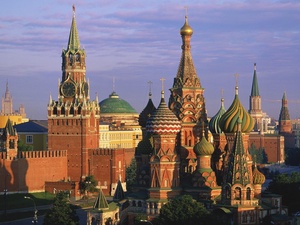
Working to discern patterns of environmental disinformation in an online world
For the past eight years, disinformation has dominated news around elections all over the world. Despite this, it is still a widely misunderstood con...
News

Publish date: June 8, 2017
News
Two influential rights advocacy groups have been called on to by the European Court of Human Rights to submit briefs supporting a suit by 61 Russian non-profits over the Kremlin’s withering foreign agent law for NGOs that operate on even small sums of international funding.
The briefs could be influential in swaying the court to demand Russia change the 2012 law, which is widely seen as a naked attempt to stifle dissent, or at least impose damages for the non-profits the Kremlin has targeted.
The court will be taking briefs from Michel Forst, the United Nations Special Rapporteur on the situation of human rights defenders, and the Institute of Law and Public Policy, a Moscow-based legal non-profit staffed in part by former Russian Constitutional Court judges and human rights court litigators.
By taking the case in March, the court agreed that a number of things about the 2012 law need to be clarified by the Justice Ministry, which enforces it by keeping a blacklist of foreign financed non-profits it says are engaged in fluidly defined “political activity.”
 The office of a Russian NGO defaces with the words "foreign agent."
Credit: Memorial
The office of a Russian NGO defaces with the words "foreign agent."
Credit: Memorial
Landing on the list is crippling: When the law was only three years old, it had shut down more than a third of Russia’s non-profits. The list swells as new foreign agents are added, and contracts as many non-profits go out of business, deciding that battling their inclusion on the list in court is too expensive.
Among the non-profits that elected to dissolve are Bellona Murmansk, which landed on the blacklist in 2015, followed by the Environmental Rights Center Bellona in January.
Those that have held on took matters to the European Court of Human Rights to demand the Justice Ministry define the slippery terms by which it manages to choke NGOs out of existence.
The Court agreed, and it has asked the Justice Ministry explain three things. First, it wants the Justice Ministry to determine whether its definitions of “foreign agent” and “political activity” are clear enough to be understood and enforced.
Then it wants to know how much money would constitute “foreign financing” to non-profits that receive it. Further, it wants Russia to detail how it conceived of the law in the first place – specifically whether it’s “necessary to a democratic society” – and if preventing political activity is such a good idea anyway.
Justice Minister Alexander Konovalov has said he will offer his responses by July 19.
Entering the fray is Olga Pododlenova, the Institute of Law and Public Policy’s senior jurist, who says she will be submitting a brief addressing two key issues that the court will have to consider when it reviews the suit from the Russian NGOs.
On the first issue, she wrote, she will present research on international legal standards on global non-profits’ rights to receive international funding. The second will provide a legal analysis on NGO operations within the European Union, and how what they have to deal with matches up with their Russian counterparts.
This isn’t the institute’s first foray into the hornet’s nest of the foreign agent law. The current suit before the Human Rights court was, in fact, precipitated by a brief filed by the institute to Russia’s Constitutional Court in 2014.
In that case, the institute slammed proponents of the law for continuing to publically push the notion that America imposes a similar law on its NGOs, and said the Justice Ministry was “pulling the wool over the court’s eyes.”
The institute added that Russia’s foreign agent law “ is far outside that which is considered necessary in democratic societies.”
Less clear is UN Special Rapporteur Forst’s contribution. He has yet to discuss his brief with the media, though he has ion the past filed other briefs to the court on behalf of Russian human rights activists.
The court’s deliberations could further be influenced the Venice Commission, a Council of Europe human rights advisory body, which found a Hungarian law that also targets foreign financed non-profits to be “incompatible with European standards.”
Russia, however, has a rocky relationship with the European Court of Human Rights, and has, since joining the Council of Europe in 1996, repeatedly challenged court rulings against it. In 2015, the Kremlin said it would ultimately be up to Russia’s Constitutional Court to decide whether Moscow honored the European Court’s decisions.
Vladimir Slivyak, chairman of Ecodefense, one of the 61 NGOs that filed suit with the court, said any decision by the court would likely be met with a flurry of appeals on the Russian side.
“In the worst case, Russia might not do anything,” he wrote when asked what he expected to come of the eventual court ruling. “So I hope they don’t do the worst.”

For the past eight years, disinformation has dominated news around elections all over the world. Despite this, it is still a widely misunderstood con...

A ruling by the European Free Trade Association Court that Norway’s continental shelf falls under the European Economic Area Agreement could dramatic...

Bellona held a seminar on countering Russian disinformation in the Arctic at the Arctic Frontiers international conference in Norway

Our December Nuclear Digest, reported by Bellona’s Environmental Transparency Center, is out now. Here’s a quick taste of three nuclear issues arisin...